Vale Tudo or vale-tudo, also known as No Holds Barred (NHB) in the United States, is an unarmed, full-contact combat sport with relatively few rules. It became popular in Brazil during the 20th century and would eventually evolve into modern mixed martial arts (MMA). For years, "Vale Tudo" was used as a synonym for MMA in Brazil, but the term fell into disuse due to the emergence of stricter rules and the influence of the media to have a more "civilized" name. It is now used to refer to an early, more rules-free stage of the modern sport.
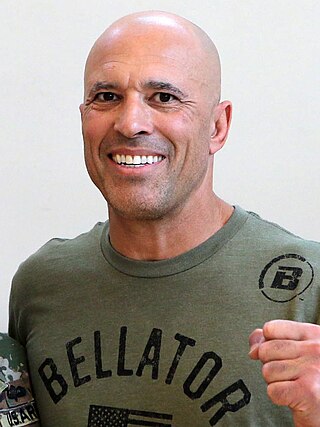
Royce Gracie is a Brazilian retired professional mixed martial artist. Gracie gained fame for his success in the Ultimate Fighting Championship (UFC). He is a member of the Gracie jiu-jitsu family, a UFC Hall of Famer, and is considered to be one of the most influential figures in the history of mixed martial arts (MMA). He also competed in PRIDE Fighting Championships, K-1's MMA events, and Bellator.

Renzo Gracie is a Brazilian mixed martial artist and 7th degree coral belt Brazilian jiu-jitsu practitioner and coach. A third generation member of the Gracie family, he is the grandson of Gracie jiu-jitsu co-founder Carlos Gracie, grandnephew of Helio Gracie, nephew of Carlos Gracie Jr. and the son of Robson Gracie.
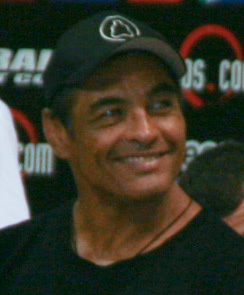
Rickson Gracie is a Brazilian retired mixed martial artist. He is a member of the Gracie family: the third oldest son of Hélio Gracie, brother to Rorion and Relson Gracie, and half-brother to Rolker, Royce, Robin and Royler Gracie. In the 1980s and 1990s, he was widely considered to be the best fighter of the Gracie clan, and one of the toughest in the world. In July 2017, he was promoted to ninth-degree red belt, the second-highest ranking in Brazilian jiu-jitsu.

Marco Antônio de Lima Ruas is a Brazilian former mixed martial arts fighter, submission wrestler, kickboxer and instructor. Ruas was the UFC 7 Tournament Champion, and also competed for the World Vale Tudo Championship (WVC), PRIDE Fighting Championships and the International Fight League, where he head-coached the Southern California Condors.
Brazilian Top Team (BTT) is an academy and team specialized in Brazilian jiu jitsu and mixed martial arts. It was established in April 2000 by Murilo Bustamante, Ricardo Libório, Mário Sperry and Luis Roberto Duarte, former members of the Carlson Gracie Academy, to develop and create new training techniques for Brazilian Jiu Jitsu, submission grappling and mixed martial arts.
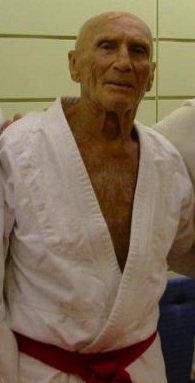
Hélio Gracie was a Brazilian martial artist who together with his brothers Oswaldo, Gastao Jr, George and Carlos Gracie founded and developed the self-defense martial art system of Gracie jiu-jitsu, also known as Brazilian jiu-jitsu (BJJ).

Carlson Gracie was a practitioner of Brazilian jiu-jitsu. A member of the Gracie family, he was the eldest son of Carlos Gracie, and nephew to Hélio Gracie, founders of Gracie jiu-jitsu.
The Gracie Challenge was an open invitation challenge match issued by members of the Gracie family, representing their self-defense system of Gracie Jiu-Jitsu against challengers of other martial art systems in a vale tudo match, or "anything goes" competition.
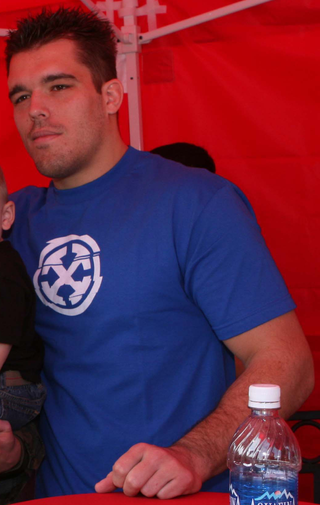
Dean Richard Lister is a retired American mixed martial artist (MMA) and submission grappler. He is a 4th degree Brazilian jiu-jitsu (BJJ) black belt, luta livre black belt, and coach. Lister is considered a pioneer of grappling and mixed martial arts.

Márcio Cruz is a Brazilian Jiu-Jitsu practitioner and mixed martial artist. In Jiu-Jitsu, he is a fifth degree black belt under Carlos Gracie Jr. and is a six-time IBJJF Mundials World Champion, five-time IBJJF Brazilian Nationals Champion, eight-time IBJJF Pan-American Champion, 2003 ADCC World Champion, two-time Abu Dhabi World Jiu Jitsu Legends Champion and UFC Veteran Fighter. His nickname "Pé de Pano" was given to him by his friends at the Gracie Barra academy in Rio and it is the Portuguese version of the name of Woody Woodpecker's horse, SugarFoot. He competed in the UFC and also had a one-fight stint as an alternate for the New York Pitbulls of the International Fight League.
The Machado Family are a family of Brazilian jiu-jitsu practitioners, mixed martial artists and grapplers. They are the founders of RCJ Machado Brazilian Jiu-Jitsu and are cousins to members of the Gracie family.
Kron Stavik Gracie is a Brazilian and American mixed martial artist, submission grappler, and instructor. He currently competes in the Featherweight division of the Ultimate Fighting Championship.

Johil de Oliveira is a Brazilian former professional mixed martial arts veteran fighter, Luta Livre practitioner who has competed in Japan's Pride Fighting Championships and Brazilian-based organizations such as World Vale Tudo Championship (WVC), IVC, Jungle Fight, UVF, BVF, Bitetti Combat and International ones such as Shooto and Cage Rage. Nicknamed "Samurai do Fogo", he has been one of the major supporters of Luta Livre in Brazil and Worldwide, alongside Marco Ruas, Alexandre Franca Nogueira and Hugo Duarte.
Amaury Bitetti is a Brazilian mixed martial arts former fighter and promoter holding the rank of 7th degree black and red coral belt in Brazilian jiu-jitsu (BJJ). Considered by many as one of the best BJJ competitors of all time, Bitetti is a two-time world jiu-jitsu champion in open weight, the first-ever to win the category, and a two-time Brazilian national champion. After competing in Vale Tudo / MMA Bitetti founded the MMA fight organization Bitetti Combate.
Remco Pardoel is a retired Dutch mixed martial artist. He competed in the heavyweight division. He has fought in promotions such as the UFC, Shooto, and Pancrase. He was a junior national champion in Judo in 1988 and a competitive BJJ grappler. He made his MMA debut at UFC 2, eventually losing to Royce Gracie. Throughout his career, he fought Vernon White, Minoru Suzuki, and Marco Ruas.
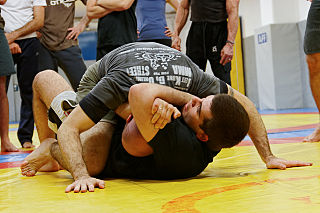
Luta Livre, known in Brazil as Luta Livre Brasileira or Luta Livre Submission, and also Brazilian Submission Wrestling, is a Brazilian martial arts and combat sport created by Euclydes Hatem in Rio de Janeiro. Primarily a mixture of catch wrestling and kosen judo, there is also ground striking with the hands, feet, knees and elbows. Notable practitioners include Marco Ruas, Ebenezer Fontes Braga, Johil de Oliveira, Alexandre Franca Nogueira, Renato Sobral, Gesias Cavalcante, Pedro Rizzo, Darren Till and José Aldo.
Eugenio Tadeu is a Brazilian grappler, Vale Tudo and mixed martial arts fighter. Tadeu was born in 1965. He was famous as a practitioner of Luta Livre, or Brazilian Submission wrestling and was one of the last representatives of this art form.
Carlos André Pederneiras de Castro is a Brazilian jiu-jitsu (BJJ) and mixed martial arts (MMA) coach and promoter. A former BJJ competitor, holding today a Red and Black 7th Degree Coral belt, Pederneiras is a six-time Brazilian National jiu-jitsu champion. During his short career as an MMA fighter, he challenged Pat Miletich for the UFC Welterweight Championship in 1999, and fought at the Shooto-run Vale Tudo Japan events.










